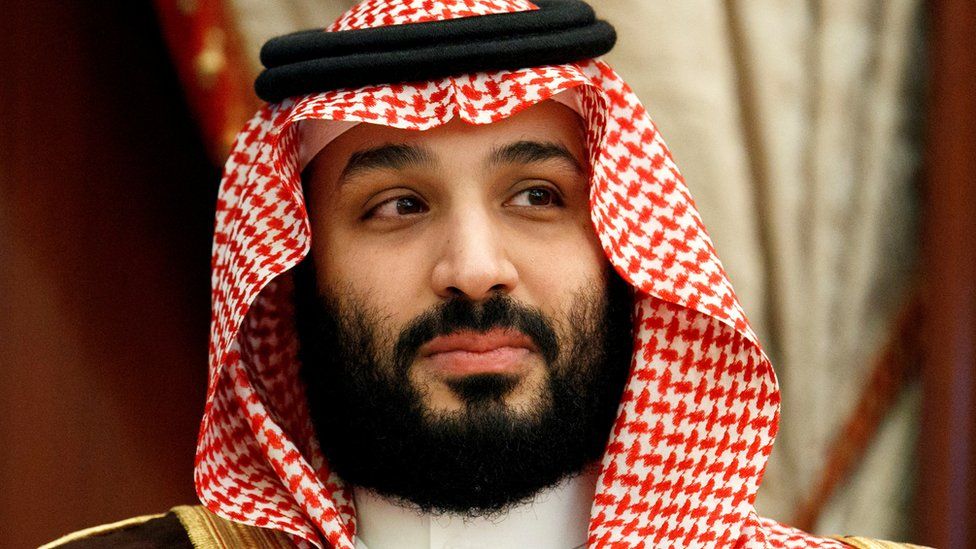
By Ione Wells & Frank Gardner
BBC News
Crown Prince Mohammed bin Salman has been invited to visit the UK, the Saudi Arabian embassy has told the BBC.
No 10 said it would confirm the prime minister’s engagements in the usual way, with nothing in the diary yet.
But a UK government source confirmed the invite and said there was no reason to think the visit would not happen.
It would be the crown prince’s first visit since the murder of the journalist Jamal Khashoggi at the Saudi consulate in Istanbul in 2018.
The murder of Mr Khashoggi, a critic of Saudi Arabia’s government, was condemned by the West at the time.
UK ministers said it involved “appalling brutality” and later sanctioned 20 Saudi nationals involved in the killing.
US intelligence agencies concluded that the prince must have authorised the killing, despite him denying any involvement.
The BBC has been told the Saudis were already making plans for a visit at least a month ago.
The visit is likely to be in October, although there is no date in the diary so far.
The invitation was criticised by the Liberal Democrats, who said it sent a signal that the crown prince “can continue acting with impunity and we and our allies will do nothing about it”.
The party’s foreign affairs spokeswoman Layla Moran said: “It beggars belief that Rishi Sunak is rolling out the carpet for Mohammed bin Salman.
“This man – who authorised the brutal murder of Jamal Khashoggi and presides over a dismal human rights record – should not be receiving a warm welcome from the UK government.”
Campaign group Amnesty International called for a new approach on relations with the kingdom “which involves a far more principled stance on Saudi Arabia’s appalling human rights record”.
Polly Truscott, Amnesty International UK’s foreign policy adviser, said: “There must be no question of the UK rolling out the red carpet for Mohammed bin Salman or of the Saudi ruler being able to use this visit to rehabilitate himself on the world stage.”
However, Labour said the UK also had to have a “dialogue” with Saudi Arabia.
The party’s deputy leader Angela Rayner said: “It’s important as part of that visit that the prime minister speaks to him about human rights.”
She added: “Part of our role internationally is to challenge other nations… and to try and influence in that way. If you don’t then you don’t have any influence whatsoever.”
Image source, Getty Images
The crown prince met the Queen during a visit to the UK six months before the murder of Jamal Khashoggi
UK ministers have indicated a desire for closer ties with the kingdom in recent months. The nation has opened an office in London for its trillion pound investment fund to diversity its economy away from oil.
Saudi Arabia has also spent billions of pounds through its Public Investment Fund on international sports deals, including a takeover of Premier League club Newcastle United and the negotiation of a dominant stake in professional golf.
Critics have described this as an attempt to “sportswash” – or distract from – the country’s human rights record.
Earlier this year, when he was business secretary, Grant Shapps held talks with Saudi Arabia over collaborating more in sectors like space, tech, and critical minerals.
The government has also been exploring support for a trade deal with the Gulf Cooperation Council (GCC), of which Saudi Arabia is a key member.
While they have not been involved in the crown prince’s invitation, a Department for Business and Trade source said securing a trade deal with the GCC was a “priority” for Business Secretary Kemi Badenoch.
The GCC is headquartered in the Saudi capital of Riyadh, where Ms Badenoch visited earlier this summer.
The source added a deal would provide “enormous opportunities to bring investment into the UK” but said talks were separate to those about a visit by the prince.
They said the government view was that “when it comes to trade deals and relationships you are in a stronger position to talk about what they are doing if working with them not lecturing from the outside”.
Then-Prime Minister Boris Johnson met the crown prince in Riyadh last year, as part of talks with Gulf leaders about ending reliance on Russian oil and gas.
However, he turned down an invite to the Queen’s funeral in September, with another senior Saudi royal attending in his place.
He last visited the UK in March 2018, when Theresa May was prime minister, six months before the murder of Mr Khashoggi. During the visit he had lunch with the Queen and dinner with the then-Prince of Wales and Duke of Cambridge.
The prince, who is the de facto ruler of the world’s leading oil exporter, won plaudits from Western leaders for overseeing some reforms in the conservative Gulf kingdom, including lifting the ban on women driving.
However, his international reputation was severely damaged by the killing of Mr Khashoggi.
Additional reporting by Becky Morton








